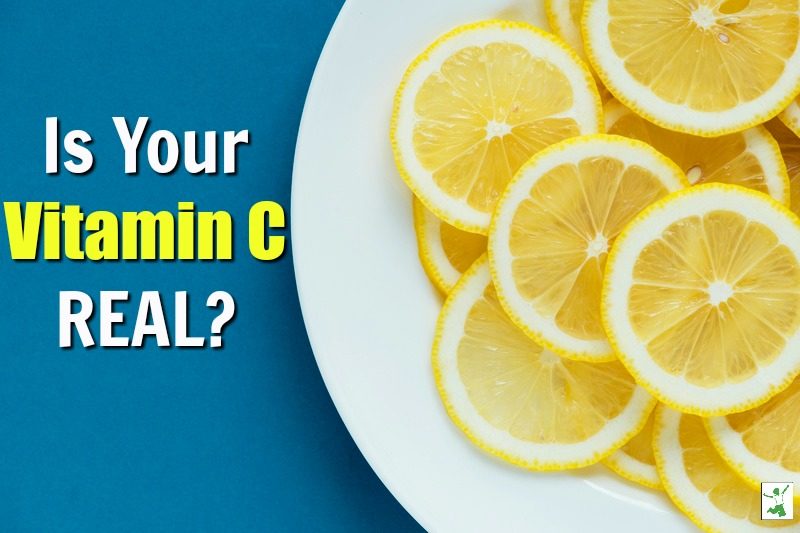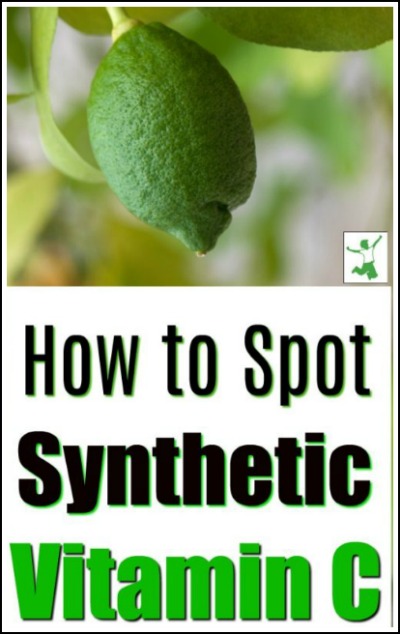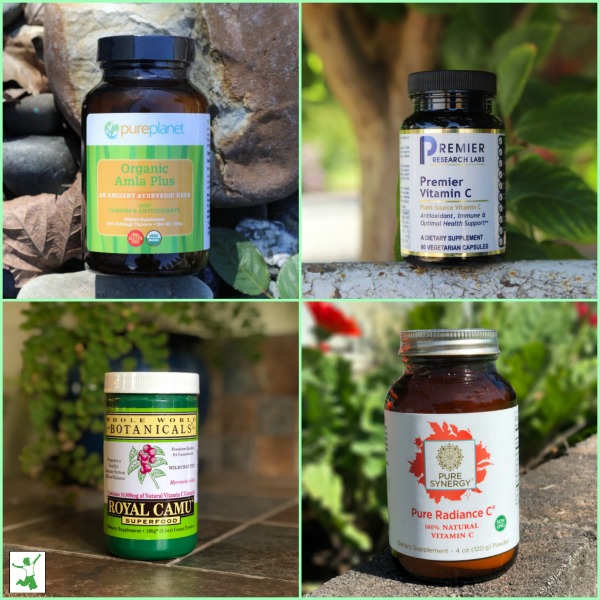Table of Contents[Hide][Show]

Did you know that ascorbic acid is actually synthetic vitamin C? What’s more, it is usually GMO vitamin C, which means it was derived from GMO corn.
If you are learning this for the first time, it can be a rather shocking realization as almost all vitamin C supplements on the market use isolated ascorbic acid separated from a whole food source. The manufacturing process that produces synthetically derived vitamin C leaves all the beneficial co-factors behind!
Even more disturbing, ascorbic acid is frequently marketed as natural vitamin C and added to organic foods as a natural preservative. Truly natural forms of vitamin C and synthetic ascorbic acid seem to be used interchangeably.
How confusing for the consumer!
Nearly all juices and fruit products are loaded up with ascorbic acid, even many organic, healthfood store versions. It seems that if a product is labeled “high in Vitamin C”, consumers buy more of it.
A lot of folks are being fooled by these misleading semantics. There is a growing body of evidence that those consuming high doses of ascorbic acid should have reason to worry.
Three Studies Suggest Caution with High Dose Ascorbic Acid
The journal Wise Traditions cites three studies that give pause about large doses of vitamin C. The first, from the Jun 15, 2001 issue of Science, showed that “synthetic vitamin C may contribute to the formation of genotoxins that can lead to cancer”.
A second study presented to the American Heart Association showed a link between consumption of only 500 mg of vitamin C per day and a greater propensity toward thickening of the arteries (Los Angeles Times, March 3, 2000).
More recently, athletes taking 1000 mg of isolated ascorbic acid per day showed reduced endurance capacity from interference with antioxidant enzymes (American Journal of Clinical Nutrition, Jan 2008).
This information should give pause to anyone who is actively taking synthetic vitamin C supplements such as those Emergen-C packets that are available everywhere, from pharmacies and health food stores to even gas stations!
Supplements like these are NOT boosting immunity and are NOT good for you!
Synthetic vitamins such as ascorbic acid act more like drugs in the body rather than whole food nutrients with all the available co-factors. Taking any synthetic vitamin can cause imbalances in the body and should be avoided.
Another worrisome and popular trend is the recommendation of some alternative health professionals to do a “vitamin C flush” during illness. This therapy (if you can call it that) calls for large doses of ascorbic acid until the onset of diarrhea.
This approach to regaining wellness has never made any sense to me. Now, with more studies indicating the danger of high doses of vitamin C, caution seems well-founded.
Fan of Linus Pauling? Consider This…
If you are a fan of Linus Pauling who popularized the notion of huge doses of Vitamin C for the common cold in the 1970s, consider this. GMO Vitamin C did not exist when Pauling was conducting his studies. GMO derived Vitamin C is what most people are unwittingly taking today!
What’s more, the studies indicating the danger of high doses of vitamin C over long periods of time had not been done yet. They were conducted long after Pauling died in 1994.
What about High Dose, Intravenous Ascorbic Acid?
What about high dose, intravenous ascorbic acid for the very ill? Note that vitamin C for IV use is almost always derived from GMO corn as well as being extremely high dose and synthetic ascorbic acid only.
Under certain circumstances and for the very ill, high dose GMO ascorbic acid therapy can be beneficial. For example, my husband used IV ascorbic acid therapy immediately after each amalgam removal. This prevented any released mercury from getting stored in the tissues. Not doing this risks the development of autoimmune disease.
However, synthetic vitamin C especially when genetically modified shouldn’t be a regular feature in anyone’s diet or supplement regimen.

Whole Food Vitamin C is Naturally Low Dose
The best way to get vitamin C on a daily basis is from whole foods sources. This will provide you this critical nutrient at a low dosage that will do no harm over the long term.
When you get the whole foods version of vitamin C, you don’t need much at all. A truly natural vitamin C supplement with no isolated ascorbic acid is naturally low-dose and yet highly effective.
Don’t forget about the benefits of fresh grassfed milk – a great source of vitamin C. The vitamin C in milk is mostly destroyed by pasteurization, along with many other nutrients. This is why buying fresh and local is so important.
Fresh and lacto-fermented fruits and vegetables (such as traditional sauerkraut) are other excellent sources of the whole vitamin C complex.
Perhaps folks feel the need to take large doses of synthetic vitamin C because all the processed foods they are eating are so devoid of the nutrient in its whole form. Switching to whole foods and dumping those vitamin C supplements in the trash would be a much better approach to boosting immunity!
Ascorbic Acid is Usually from Genetically Modified Corn
What’s worse is that ascorbic acid is not just synthetic. Remember that it is also usually derived from genetically modified corn! More on that GMO vitamin C travesty fooling millions of consumers every single day in the linked article.
Another vitamin scam harming consumers concerns synthetic folate commercially known as folic acid.
The pushing of beta carotene as true vitamin A by food manufacturers and supplement companies is another nutritional falsehood scamming millions of consumers and worse, seriously harming their health.
What to Look for in a True Vitamin C Product
To give you some idea of what to look for in a vitamin C supplement, here are the ingredients of the one I use. Notice that there is no isolated ascorbic acid or other ascorbates and no additives. Just pure food Vitamin C sources. Please note that this is not the only Vitamin C supplement that qualifies as totally pure. There are a few others.
Pure Radiance C ingredients: camu camu berry extract, manioc root, acerola berry extract, amla berry extract, buckwheat sprouts, freeze-dried berry blend, blueberry, raspberry, cranberry, cherry, rose hips fruit, lemon peel, black pepper berry extract.
I also use the Amla C Plus. Here are the ingredients: Organic Amla berry, organic spirulina.
Notice that the words “ascorbic acid” are not listed in either of these products!
Want to know where to find a complete line of whole food Vitamin C supplements from a variety of whole food plant sources?
Click here for several carefully vetted brands to choose from.









Vitamin C therapy under certain dire circumstances is fine as ascorbic acid – being synthetic is actually a drug anyway in my opinion. Using drugs under certain conditions of serious illness is fine. Now, I don’t agree with these folks who are addicted to the Vitamin C intravenous therapy just for the cosmetic benefits for example.
MaryK my husband and were just talking about this!!! thehealthyhomeeconomist is just another person with no training in medicine, natural or western. #annoying!
Didn’t Linus Pauling use ascorbic acid?
I’m disappointed with this specific blog. I think it’s not well researched and while I realize that this is a personal blog, I’m hugely disappointed that readers may not understand that this is a lay person writing it and not someone who is trained to objectively assess data, or has a deep understanding of the body and it’s biochemical functions. For every study stating the concerns of vitamins, there are 10 more that state the opposite, vitamin C included. And those “whole food” vitamins people are taking are not regulated, not standardized, and many of those companies do not have proper quality assurance measures. I agree that food is always the best (and should b the first) medicine, but we also have to consider how depleted our soil is when considering foods (and whole foods vitamins, which are not often whole food at all) as the single source, along with pesticides and other growing practices.
I did NOT know that…ugh and thanks!
What about the vit C therapy during whooping cough?
We used vitamin c aka ascorbic acid this past winter to treat our daughter’s whooping cough. We had tried everything from broth, lemon juice syrup w/ honey, spices, essential oils – everything except traditional medicine. She was getting worse and vomited every time she coughed. Within 24 hours of starting the AA she was markedly better and in 2 days a different child. There are some great articles on line about the benefits of vitamin c therapy for treating whooping cough.
Dr Suzanne Humphries recommends powdered sodium ascorbate, not ascorbic acid, for whooping cough. We have been using it for our wc with great results. Available from amazon.com.
We too used it for Whooping cough with great results. My daughter was feeling so much better within 24 hours of starting Dr. Humphries protocol.
True Vitamin C is great, Pat, synthetic ascorbic acid- not so much. Work on getting full spectrum Vitamin C from food sources (amla berry, camu camu, etc) with associated bioflavonoids, etc.
Often made in China. So who knows how pure it is either. I only trust my homemade, homegrown juice…
So glad to read this. I had read in several places how Vit C heals your heart and I wanted to get off the meds I’m on. I started taking 1-2,000 mg of Vit C like I had read. Guess I won’t do that any more! Thanks so much!
Pat,
Please read all the other comments before you discontinue the vitamin! There’s so much more to take into consideration than what was covered in the post.
Sarah James – my husband is training for a half Iron Man and he drinks kombucha. It’s made a world of difference for him and he tries to tell everyone he can. I brew about four gallons at a time for my family – he ends up with most of it.